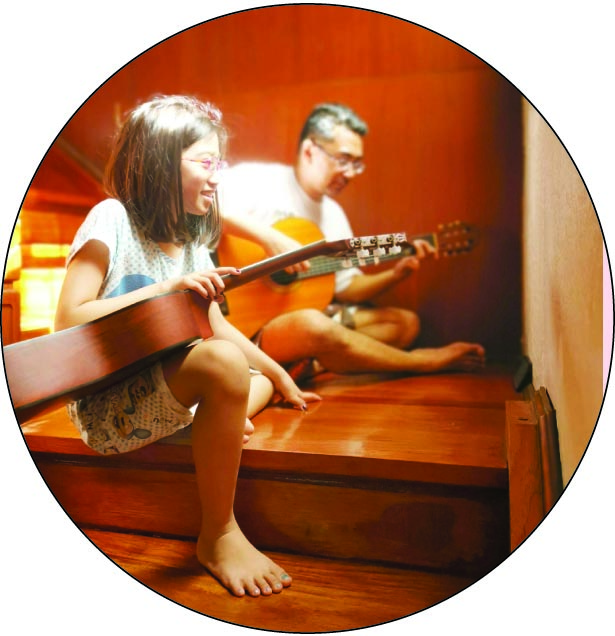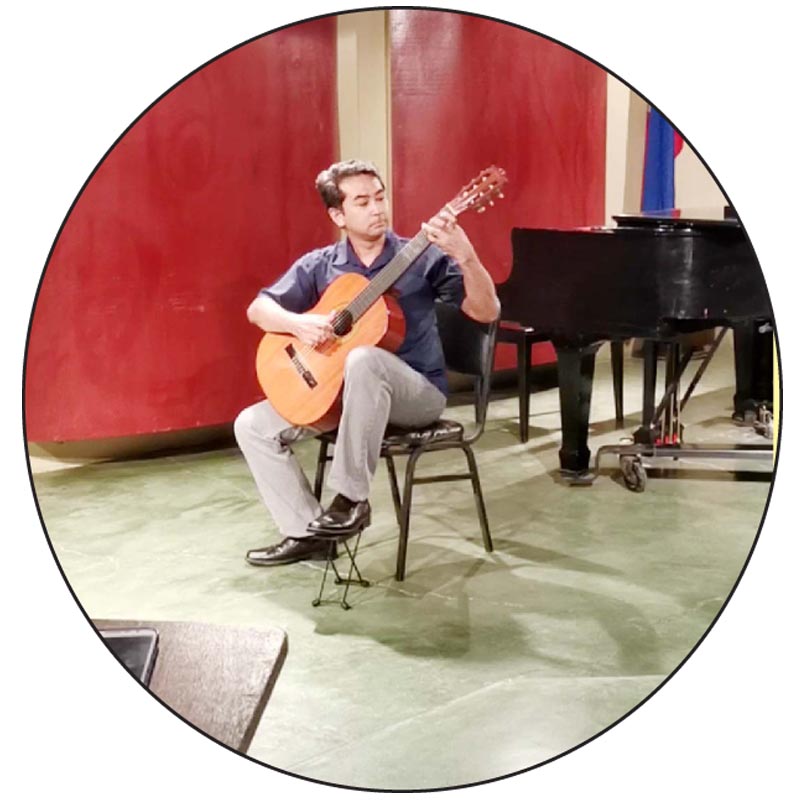My 40-something-year-old husband felt like a kid again as he joined 21 other performers at a small recital at the University of the Philippines College of Music Extension Program.
We have always believed that the arts are important. Our children do not need to become professionals at their craft, but we want them to hone the skills.
I have written about Achi and her love for ballet. I just finished reading a memoir she wrote for school. She ended with, “I don’t know exactly what about ballet makes me so happy. It just does.”
This time for music, Shobe is the star.
When we got married, all my husband brought into our home were his clothes, a box of cassette tapes and four guitars (classical, folk, electric and bass). After Achi was born, he got a ukelele from Cebu. Since he could not live without music, he bought another ukelele when he was in Amsterdam for three months. He got me a small guitar too and tried to teach me. But to his dismay, I have zero musical bones.
Shobe first got hold of the ukelele when she was 2 years old. She sat on our stairs and started strumming and singing “Bahay Kubo.” She didn’t know how to play, but she got the rhythm perfectly.
“Looks like the kid has an ear for music,” her father said.
At 4 years old, Shobe wanted to play the violin. She studied the instrument until she was 7. Our main problem there was that she needed to practice at home. However, if she made mistakes, neither husband nor I could teach her how to do it correctly. Her school campus moved to far away Fairview, in Quezon City, and we could not do lessons anymore.

Again, we can’t live without music, so Tatay started teaching her to play the ukelele. She was motivated because her 9-year-old friend could already play the Sound of Music’s “Doe-a-Deer.” Her friend taught her how to play a counterpoint and they were so proud of themselves.
Shobe already knew how to read sheet music from violin class so Tatay taught her how to read chords. One of her favorite songs she learned to read and play by herself is the theme song to a cartoon short film called “Lava.” She went on to test her skills and started playing random songs.
In 2017, Tatay said she needed to move up to guitar. They started learning and practicing and had bonding moments on our staircase landing (which apparently has the best acoustics in the entire house).
This June, father and daughter enrolled in a classical guitar class at UP.
He had learned to play there when he was 12, under the master of masters Lester Demetillo. Husband wanted to take lessons again because, he said, his timing is always off, and he needs a professional teacher to help him out.
Meanwhile, Shobe needed a teacher who could push her. At home, she just wraps Tatay around her little finger, so progress is turtle-slow. An assessment placed Shobe at intermediate level and she was given one-on-one lessons.
She improved by leaps and bounds in just six lessons. But whatever we did, no one could convince her to play at the recital. She was nervous and felt she could not play well. Even after we told her that all recital performers are nervous and many are even first-timers, she would not budge.
“That’s just a recital, it’s not important,” some might say.
To which I say, “Recitals can be the beginning of how our children develop resilience.”
Recitals are good experiences for children. They learn to deal with nervousness, manage themselves while waiting for other performers to finish, face their fears, and push on despite everything they’re feeling and thinking.
Stage fright is real!
The anxiety mounts and cold sweat just pours. But when one looks around and sees that everyone else is in the same condition, then the feeling becomes: “I’m not alone.” Thoughts become: “If they can do it, so can I.”
It was a good experience for her to see first-time performers, and her father, make mistakes during the recital. This is important. When children see people make mistakes at a recital, and the world did not disintegrate, it is a life lesson that things will be okay. I hope it will give her more confidence for the December recital.
Simply being exposed to a musical instrument is already a big thing.
I recall reading an article last year where doctors lament the lack of fine motor skills among surgeons.
“Roger Kneebone, professor of surgical education at Imperial College, London, says young people have so little experience of craft skills that they struggle with anything practical,” reported BBC News.
In the past, children played with their hands. They made crafts and created everything themselves. They cooked and learned to navigate their bodies in potentially dangerous situations like heat and fire from the stove and knives. These activities done with one’s own hands enabled them to develop highly precise fine motor skills.
These days they are limited with swiping and tapping a screen.
Playing musical instruments work the same way. Fingers are strengthened; they develop muscle memory. These are skills that will serve them well in whatever occupation they hold as adults.
In a recent study, Canadian researchers found a correlation between the ability to play music and success in academic performance. The study looked at more than 100,000 students who engaged in music – vocal and instrumental – and found that they scored higher in English, math and science than those who did not.
More significantly, the differences in scores for math and science were even greater for those who played musical instruments.
This is great news for Tsinoy parents. We do have stereotypes of Tsinoys having a piano in the living room, and excelling academically. Now, there is a bigger push for us to really have our kids play and not leave the piano for display.
On our home front, I have put my foot down already. I told Shobe that if Tatay and Achi do recitals every time, so does she.
